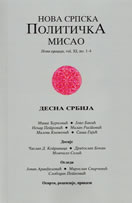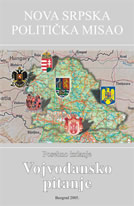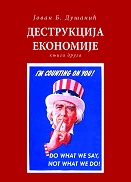| NSPM in English | |||
Odyssey Dawn and Twilight of Civilization – a View from Serbia |
 |
 |
 |
| недеља, 03. април 2011. | |
|
Generally speaking, there are many things about these Arab revolutions that could seem funny were they not pathetic and tragic. For example, there are these tales about unarmed Libyan civilians who capture tanks and then shoot down Gaddafi’s planes, or that gatherings of between several dozens and a couple of hundreds of thousands of protesters on a square in Cairo could topple Mubarak’s regime. Not to mention the news coverage of all these events. At the same time while Qatari Al Jazeera meticulously covered every breath of anti-Gaddafi protesters in Benghazi and put on the back burner even the information that its own crew was killed in the territory controlled by the rebels, right in front of their noses, in Bahrain, their first neighbor, opposition protests were suppressed, turning them into a bloodbath, and followed by foreign military intervention from Saudi Arabia. But Bahrain is ruled by the local Saudi-American puppet, whereas most of the protesters were pro-Iranian Shias, and both CNN and Al Jazeera showed no interest in what was going on. As expected, this propaganda frenzy became even worse when the bombing started, and there were silly details, such as CNN’s comical dubbing of Gaddafi’s speech. To make it even more repulsive, it was done by a hoarse voice in bad English with an Arab accent. Another point is the stance of Russia (and of China, although it is little known that Chinese practice is never to veto unless in case of Taiwan and if their national interests are directly jeopardized) during the vote about the “no-fly zone” in Libya in the UN Security Council. Serbian supporters of Russian policy, both professional and self-styled ones, who think it is perfect, have been saying that it is probably some kind of “Russian ploy” and that we shouldn’t worry, question or doubt it. The more sincere, honest and naive people were mostly puzzled and disappointed. On the other hand, as expected, local anglophiles rejoice and remind us that they have always said that “the Russians have never helped anyone” and that they always leave their allies in the lurch. Of course, the worldwide match in geopolitics is well under way, the stakes are high and the fate of Libyan, Serbian or any other people is quite insignificant. And, of course, the Russians will not be left without certain compensations, either by means of almost certain rise of oil prices and the expected increase of anti-Western sentiment among the Arab populace. However, if they have any global ambitions, it is not good for Russia and China to create the impression that the Western countries always have it their own way, while they back down in the end. Therefore, one should have no doubts that this Russian aloofness will have a strong and painful impact in Serbia, especially among the Russophile public and cast a shadow on the forthcoming Putin’s visit. And finally, what about us? Strangely enough, this time we haven’t had time to disgrace ourselves, although it is still not too late, or at least our disgrace is still small when compared to the disgrace of the great ones and the West. On the one hand, Gaddafi’s Libya has been our true and loyal friend. And on the other, Gaddafi is being bombed by those whose friendship is desperately sought by our authorities and our quasi-opposition. Furthermore, after this public lesson and global display of unyielding power, one has fewer reasons to criticize those who came to the conclusion that in this case one should be “wise and pragmatic”, which here refers to being a selfish hypocrite. But the problem is that Serbia, bearing in mind its recent experience with a similar “humanitarian intervention”, should be the last country to show slightest understanding for this kind of action. In the end, we can now make a well-founded assumption about what we could have expected if Milošević had been more determined, courageous or unwise on October 5, or if his leading generals and policemen had not so unscrupulously abandoned him as they did. We would have most likely experienced a civil war, forced secession of Montenegro and NATO intervention to protect the civilians. Of course, the opposition enjoyed major support in Serbia, which is not clear enough in case of Libya (and there is no oil in Serbia), but the principle is more or less the same. If the regime had not stepped down and if the system had not fallen apart, an already prepared and operating machinery would not have stopped, whereas “the plight of civilians” is always just a feasible excuse for starting the intervention, and never for stopping it. What initially seems paradoxical, after every “humanitarian intervention” and “orange and flowers” revolution, which are just two sides of the same coin, there is an ever growing anxiety about our unique case of spontaneous popular uprising against authoritarian regime. Time can heal certain wounds, and some instances of disgrace eventually fade. But as the time passes, some of them become even more conspicuous. |
Остали чланци у рубрици
- Playing With Fire in Ukraine
- Kosovo as a res extra commercium and the alchemy of colonization
- The Balkans XX years after NATO aggression: the case of the Republic of Srpska – past, present and future
- Из архиве - Remarks Before the Foreign Affairs Committee of the European Parliament
- Dysfunction in the Balkans - Can the Post-Yugoslav Settlement Survive?
- Serbia’s latest would-be savior is a modernizer, a strongman - or both
- Why the Ukraine Crisis Is the West’s Fault
- The Ghosts of World War I Circle over Ukraine
- Nato's action plan in Ukraine is right out of Dr Strangelove
- Why Yanukovych Said No to Europe

.jpg)








 Just don’t tell me that Gaddafi is being ousted because he is an authoritarian ruler who has no democratic legitimacy. Libya is neither Switzerland nor Sweden, but a slightly bizarre family dictatorship, which is doubtless. However, at the same time, it is also doubtless that when compared to some of its Arab counterparts, including American favorites from the Saudi Kingdom, Gaddafi’s Jamahiriya almost seems like democratic Athens in Pericles’ Golden Age.
Just don’t tell me that Gaddafi is being ousted because he is an authoritarian ruler who has no democratic legitimacy. Libya is neither Switzerland nor Sweden, but a slightly bizarre family dictatorship, which is doubtless. However, at the same time, it is also doubtless that when compared to some of its Arab counterparts, including American favorites from the Saudi Kingdom, Gaddafi’s Jamahiriya almost seems like democratic Athens in Pericles’ Golden Age.












